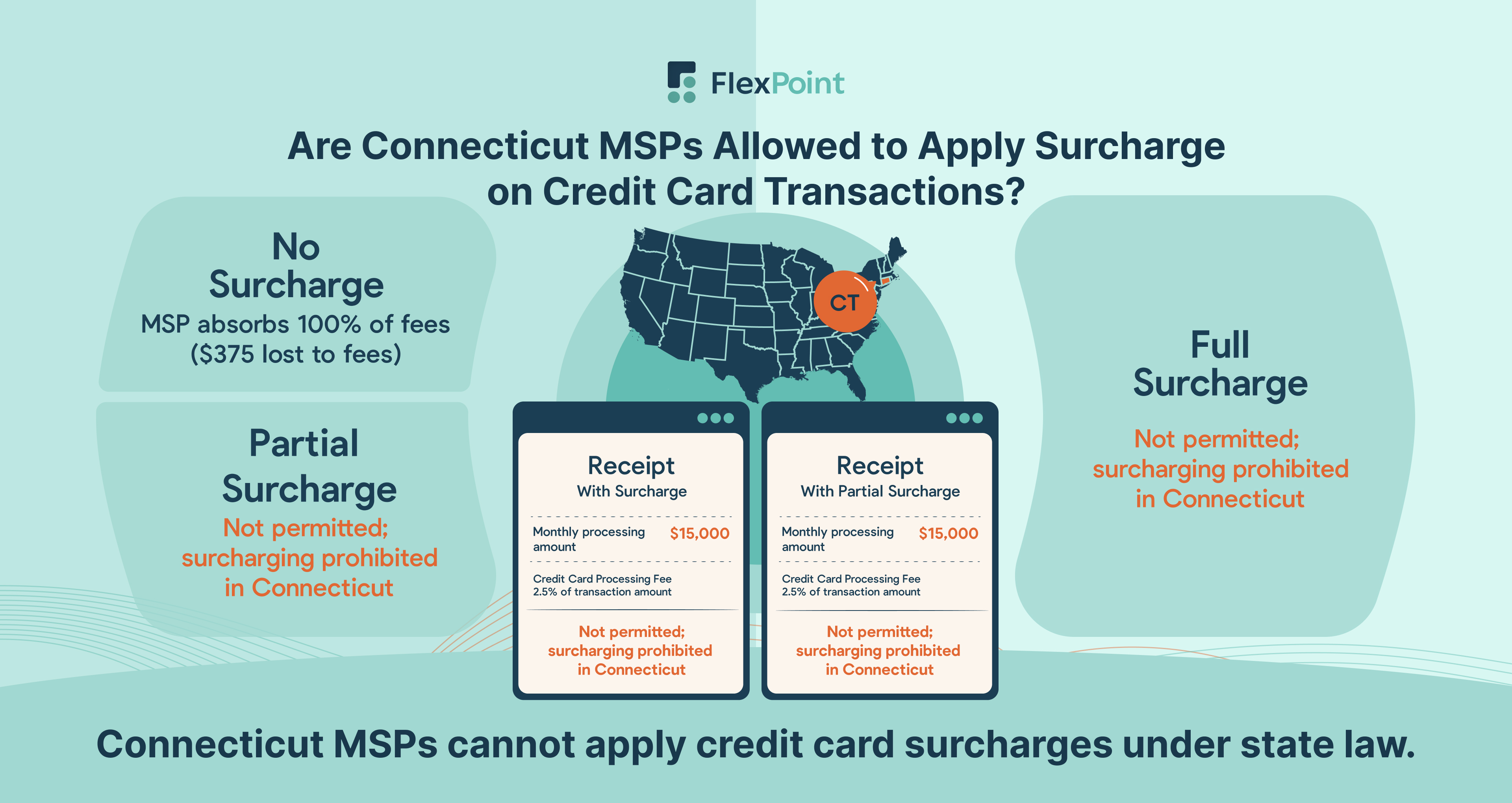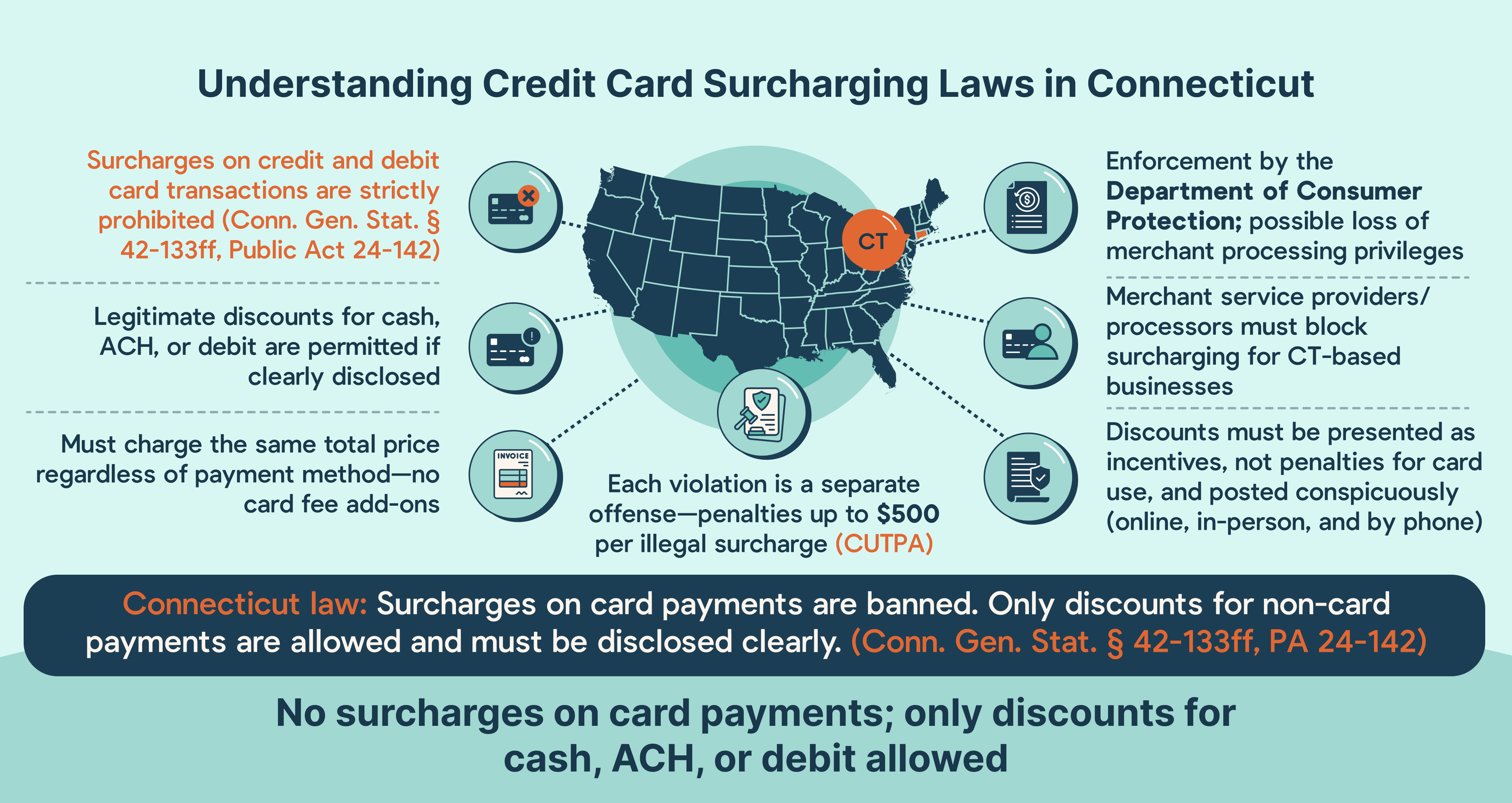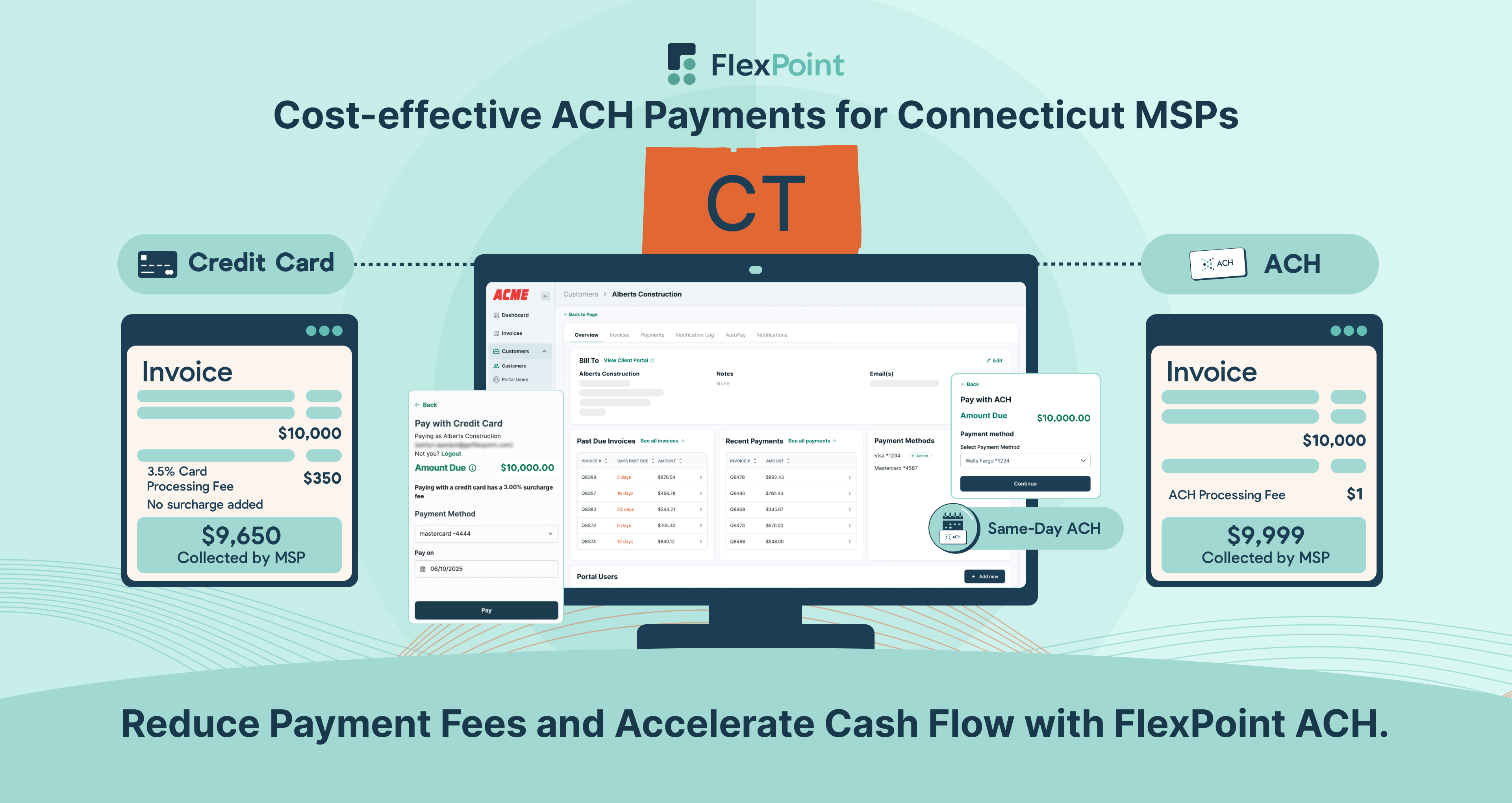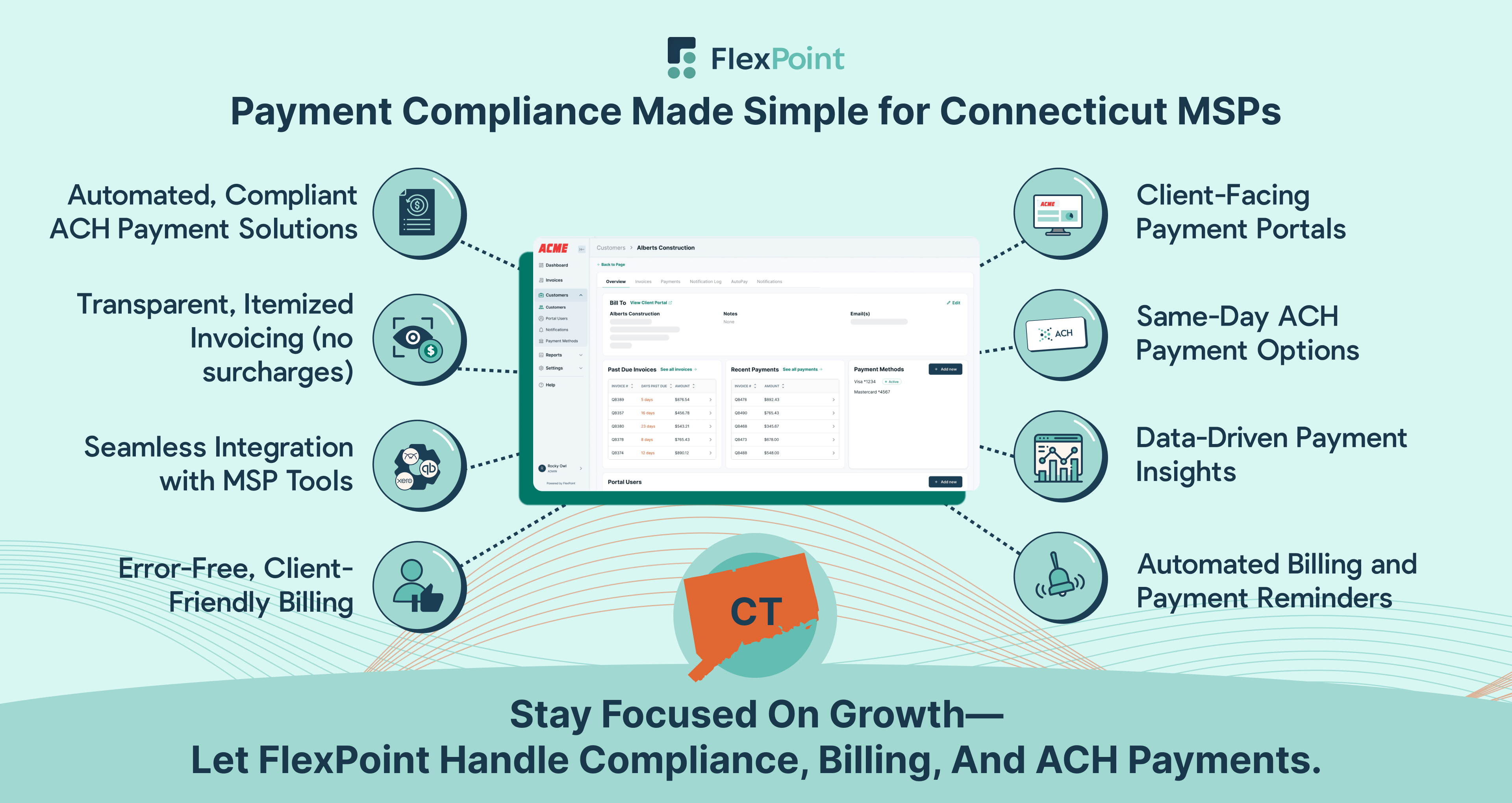
Managed Service Providers (MSPs) in Connecticut face a unique challenge regarding payment processing: credit card surcharging is explicitly prohibited under state law (as of [$c-month-year]May 2025[$c-month-year]).
In Connecticut, MSPs are barred from charging additional fees to clients who choose to pay with credit cards. This restriction means that while MSPs in some other U.S. states can offset their credit card payment processing costs, Connecticut MSPs must absorb them entirely.
Typically, MSPs processing client payments in Connecticut encounter credit card processing fees ranging from 2% to 4%, depending on the card type and network.
This article will break down the specific Connecticut surcharging rules MSPs must follow, explain the consumer protection rationale behind these regulations, and present realistic cost-control options that stay firmly within legal boundaries.
It will cover strategies like promoting ACH payments to reduce merchant costs, negotiating payment terms directly into service agreements, and leveraging smart payment platforms like FlexPoint to simplify billing workflows and minimize reliance on high-fee card transactions.
{{toc}}
What is Credit Card Surcharging for Connecticut MSPs?

Credit card surcharging is the practice of adding a small fee, typically a percentage of the total bill or a fixed dollar amount, when a client chooses to pay with a credit card.
The primary objective of this strategy is to offset the payment processing fees that MSPs incur when using card brands such as Visa, Mastercard, and American Express.
In states where surcharging is permitted, managed service providers often use it to recoup the average 2% to 4% cost per credit card transaction.
For example, an MSP operating in a state where surcharging is permitted might add a 3% surcharge to a $5,000 invoice, passing an extra $150 directly back to the client to cover merchant fees. Card networks usually impose strict caps on these surcharges, and merchants must disclose the added cost clearly to avoid misleading clients.
Connecticut, however, does not allow this practice.
Under Connecticut General Statutes §42-133ff, adding any surcharge to a transaction because the client chose to use a credit card is illegal. MSPs are not permitted to shift credit card costs to clients through add-on fees, regardless of whether the fee is flat, percentage-based, or simply labeled differently.
If a client pays a $15,000 invoice using a credit card, the MSP must absorb the processing cost, approximately $375 if the fee is 2.5% without passing it along. Over the course of a year, if an MSP processes $180,000 in card payments, this means paying around $4,500 as a cost of doing business.
This strict prohibition protects consumers by ensuring price transparency and transparency in pricing strategies. Connecticut law requires the posted or quoted price to reflect the full amount owed without additional charges for using a particular payment method.
Understanding the difference between what is allowed elsewhere and what is required in Connecticut is imperative. Noncompliance can result in civil penalties of up to $500 per violation, reputational harm, and payment disputes arising from unclear billing.
Encouraging clients to use ACH transfers, setting appropriate service pricing, and utilizing automation platforms like FlexPoint to manage billing efficiently are all legal and smart ways to stay profitable without violating Connecticut’s strict surcharging rules.
{{cal-one}}
Understanding Credit Card Surcharging Laws in Connecticut

Connecticut General Statutes § 42-133ff, as updated by Sec. 28 of Public Act 24-142, clearly prohibits any seller or service provider—including MSPs—from adding fees to a transaction based on the method of payment used.
In other words, MSPs cannot charge a higher total simply because the client chooses to pay by credit card rather than by cash, check, ACH, or other low-cost methods.
The law states (in part):
"No person may impose a surcharge on any transaction.”
For managed service providers operating in Connecticut, this means you cannot legally add any fee to recover your credit card processing costs.
Even if your standard merchant costs for Visa or Mastercard transactions average 2.8%, and American Express fees run closer to 3.5%, you are required to absorb these expenses without charging the client extra.
{{debit-cta}}
Why Credit Card Surcharging is Prohibited in Connecticut
The state's ban on surcharging is rooted in protecting consumers from hidden costs and ensuring complete price transparency.
Connecticut wants clients to know exactly what they owe upfront—no surprises, no additional fees tied to payment methods.
For example, if a service is listed for $2,200, and the client chooses to pay with a credit card, they must still pay $2,200; not $2,200 plus 3% or any other added fee.
Instead of allowing surcharges, Connecticut permits MSPs to offer legitimate cash discounts. An MSP may advertise the credit card price as regular and provide a visible discount to those paying with cash, debit, or ACH.
As per Sec. 28 of Public Act 24-142:
“(c) (1) Nothing in this section shall prohibit any person from offering a discount on any transaction to induce payment by cash, check, debit card, or similar means rather than by charge card or credit card. No person may offer any such discount unless such person posts a notice disclosing such discount. Such person shall clearly and conspicuously (A) post such notice on such person's premises if such person conducts transactions in-person, (B) display such notice on the Internet web site or digital payment application before completing any online transaction or transaction that is processed by way of such digital payment application, and (C) verbally provide such notice before completing any oral transaction, including, but not limited to, any telephonic transaction.”
For instance, an MSP might list a cybersecurity package for $2,050 but offer a $50 discount if the client pays by ACH. The difference must be framed as a reward for using a low-cost method, not as a penalty for credit card use.
It's a subtle but crucial legal distinction, and Connecticut enforces it carefully.
Major card networks like Visa and Mastercard recognize that state law overrides their network rules. Although these networks lifted their general surcharge prohibitions in 2013 after legal settlements, they defer to state laws where surcharging remains banned.
Connecticut is on the short list of states where merchant processors, banks, and networks refuse to authorize surcharge programs.
If an MSP in Connecticut attempted to enroll in a surcharge program through a processor, the application would almost certainly be rejected based on your business address. Payment gateways and merchant service providers operating in the state are required to block any setup that would impose surcharges in violation of § 42-133ff.
Recent changes to Connecticut law reinforce this stance. In 2023 and 2024, the legislature amended the surcharge law to clarify definitions, expand the law's coverage, and formalize enforcement processes.
The updated statute explicitly covers all forms of sales and leases, and gives the Department of Consumer Protection the authority to investigate violations and impose civil penalties.
Despite court rulings in other states, where bans in places like Florida, California, and Texas were found unconstitutional under certain conditions, Connecticut’s version of the surcharge prohibition remains active and enforceable.
The law was explicitly updated to withstand legal challenges by focusing on transaction amounts and consumer transparency rather than restricting merchant speech.
Key Legal Penalties and Implications for Non-Compliance
Non-compliance with Connecticut’s surcharge laws carries serious consequences.
First, violations are considered unfair or deceptive acts under the Connecticut Unfair Trade Practices Act (CUTPA). This empowers the Department of Consumer Protection to initiate investigations, administrative hearings, and, when necessary, civil lawsuits. MSPs found violating the surcharge law can face penalties of up to $500 per violation.
Each illegal surcharge counts as a separate offense. An MSP that improperly processes 10 client invoices per month, with a 3% surcharge on each, could result in $5,000 in fines in a single month, excluding any restitution to clients or reputational damage.
Payment processors also monitor compliance closely. If a card network or acquiring bank finds out an MSP is surcharging unlawfully in Connecticut, they can terminate the merchant account, apply additional network fines, or even blacklist the MSP from future credit card processing.
Beyond formal penalties, improper surcharging can lead to client disputes. A client who discovers an undisclosed surcharge may refuse payment, demand a refund, or escalate to legal action. These disputes can damage long-standing business relationships and tarnish your MSP’s reputation in the market.
Given the strict regulations, maintaining complete transparency and accuracy in your billing practices is fundamental to operating lawfully in Connecticut.
MSPs should review all invoices, contracts, and client communications to ensure pricing structures comply with § 42-133ff. Any incentives tied to payment methods should be carefully presented as a discount for non-credit card use and disclosed clearly at the time of sale.
{{usa-cta}}
Alternative Cost-Effective Payment Methods for Connecticut MSPs

Because Connecticut law prohibits adding credit card surcharges (as of [$c-month-year]May 2025[$c-month-year]), MSPs must be more deliberate in controlling the costs associated with client payments. One effective option to manage expenses legally and efficiently is to promote alternative payment methods with significantly lower processing fees.
Among these options, ACH payments stand out as an advantageous solution for Connecticut MSPs. ACH, short for Automated Clearing House, is a network that moves money directly between bank accounts without routing the transaction through a credit card processor.
For example, if your MSP invoices a client $8,500 for managed IT services, an ACH payment would debit the full $8,500 directly from the client’s business checking account and deposit it into your business account without involving Visa, Mastercard, or American Express networks.

One of the primary advantages of ACH is its cost-effectiveness.
Through FlexPoint, ACH payments usually cost between $0.25 and $1.00 per transaction. Many services also set maximum caps, ensuring fees stay reasonable even as invoice amounts grow.
When you compare these rates to the typical ~3 to 4% processing fee that credit card brands charge in Connecticut, the difference is substantial. ACH allows MSPs to avoid the interchange fees and assessment charges associated with card payments.
However, lower cost is just one of several reasons ACH makes sense for MSPs in Connecticut.
1. Faster Processing

While traditional ACH processing could take up to five business days, payment auotmation tools like FlexPoint now offer Same-Day ACH capabilities.
Payments submitted before 4:00 PM Eastern Time can reach your bank account by the close of business that same day. FlexPoint’s Same-Day ACH is a major improvement for MSPs that often operate on tight billing cycles and need quick access to funds for expenses like software renewals, employee payroll, or vendor payments.
Speeding up receivables by even a few days can have a noticeable impact on cash flow, especially when multiple large invoices are in play.
2. Lower Fees On High-Value Payments
Many MSP agreements involve sizable invoices—often $7,000, $15,000, or more per month per client. ACH remains affordable even at these higher transaction amounts.
For example, a $15,000 credit card payment processed at 3.4% would cost around $510 in fees.
If the same client pays by ACH, the cost would average between $0.25 and $1.00 per transaction. If even a few large clients stop paying with cards, the savings over a full year could easily exceed $18,000.
Reducing overhead in this manner frees up funds for technology investments, client upgrades, or other operational enhancements.
3. Security and Reliability
ACH payments are also generally considered safer for recurring business transactions.
According to JP Morgan’s 2023 AFP Payments Fraud and Control Survey Report, 30% of businesses reported experiencing fraud involving ACH debits, while 36% reported fraud with corporate credit cards.
Although fraud remains a risk across all payment methods, ACH offers slightly lower exposure, especially when combined with strong client authorization procedures.
Another critical difference is in dispute handling.
Credit card transactions are prone to chargebacks, which can cost MSPs around $190 per incident when factoring in penalties, fees, and lost revenue, according to Swipesum.
In contrast, while possible, ACH reversals are typically easier to defend against if the proper authorization documents are maintained. Fewer disputes mean fewer operational headaches and less risk to your cash flow.
Switching to ACH also eliminates the need for managing physical checks, reduces administrative costs, and eliminates delays caused by lost or misrouted mail.
4. Client Convenience
From a client perspective, ACH is one of the most convenient payment methods available.
Clients typically only need to authorize ACH payments once by completing a brief form. After setup, payments can be automatically pulled on the due date, eliminating the need for clients to manually pay invoices or update their expiring credit card information.
ACH payments don’t face credit limit issues or card expiration problems either. As long as funds are available in the client’s bank account, the payment will process reliably.
The simplicity of ACH payments is a significant advantage for busy finance departments, IT managers, and small business owners. It also makes on-time payments more consistent.
ACH delivers a combination of cost savings, speed, security, and client convenience.
With built-in ACH tools offered by platforms like FlexPoint, Connecticut MSPs can streamline their billing operations, protect their margins, and remain fully compliant with the state’s strict surcharging prohibitions.
{{ebook-cta}}
How FlexPoint Supports Connecticut MSPs in Reducing Processing Costs

In Connecticut, managed service providers must find ways to lower transaction costs without relying on surcharges.
Strict state laws, such as Connecticut General Statutes § 42-133ff, make it illegal to pass credit card processing fees directly onto clients.
Fortunately, billing platforms like FlexPoint offer solutions that help MSPs manage payment expenses, automate billing, and maintain compliance without sacrificing profitability.
Here’s how FlexPoint
1. Compliance and Transparency
FlexPoint was designed to accommodate different state regulations, including Connecticut’s strict prohibition on surcharging. Its platform settings prevent MSPs from applying any additional fees that would violate § 42-133ff.
Instead of allowing surcharges, FlexPoint structures invoices around complete transparency. Payment requests show the total amount owed without hidden charges based on the payment method.
Discounts for using alternatives like ACH can be clearly presented, but card-paying clients will never see added percentages or unexplained fees.
If audited or challenged, MSPs using FlexPoint can easily generate transaction records to demonstrate adherence to Connecticut law.
Keeping billing clear and compliant not only avoids regulatory penalties but also bolsters client confidence.
Clients value predictability. By displaying transparent, upfront pricing with FlexPoint, MSPs can avoid complaints about “hidden fees” and offer a better payment experience.
2. Operational Efficiency
FlexPoint eliminates many of the manual tasks that are known to complicate billing and payment collections.
The platform connects directly to MSP software tools and accounting systems such as:
Once set up, invoices can be created automatically, payment links generated instantly, and payments reconciled without human intervention.
If a client pays using an ACH or credit card, the invoice is automatically updated, closed, and posted to accounting records.
FlexPoint’s automation covers subscription billing, usage-based charges, and client notifications, creating a payment system that requires minimal manual intervention.
Let’s take the example of Excellent Networks, an MSP located in El Paso, Texas. After switching to FlexPoint, they accelerated their billing cycle dramatically, reducing the average time to collect on invoices from 25 days down to just 5 days.
Alongside the faster collections, Excellent Networks also eliminated approximately 24 hours of manual administrative work each year.
Thanks to FlexPoint’sAutoPay functionality and automatic reconciliations, they now save more than $10,000 annually in credit card processing costs.

3. Optimized Cost Management
FlexPoint gives Connecticut MSPs multiple ways to manage and lower the hidden costs tied to payment processing.
To begin with, FlexPoint makes it easy to promote ACH payments over credit cards. MSPs can encourage clients to use ACH by offering "no fee" options at checkout while still remaining compliant with state law by avoiding any language that penalizes card users.
Clients are presented with straightforward choices, and many opt for ACH once they realize it is secure and effortless after setup.
Second, FlexPoint provides real-time analytics showing exactly how much money is spent on credit card fees versus ACH payments.
An MSP processing $500,000 annually could discover that shifting even 30% of volume to ACH would save roughly $12,000 in unnecessary fees based on an average card rate of 2.4%.

Access to this information empowers MSPs to make smarter decisions around client payment options, fee negotiation strategies, and internal financial forecasting.
Finally, FlexPoint’s pricing structure includes a set amount of Same-Day ACH transaction processing at no additional charge. This allows MSPs to take advantage of faster payment clearances without being penalized with hidden fees, further supporting cash flow stability.
By utilizing all these features, Connecticut MSPs can:
- Significantly reduce operational costs
- Better manage cash flow
- Avoid any risks tied to improper billing practices
FlexPoint gives MSPs a practical, fully compliant way to modernize collections, minimize reliance on high-cost credit card payments, and turn payment operations into a competitive advantage instead of a liability.
Conclusion: Navigating Payment Compliance in Connecticut

While Connecticut’s ban on credit card surcharges adds complexity for MSPs, it does not prevent MSPs from managing payment costs effectively.
The first step is understanding both the letter of the law and its intent: ensuring clients see honest, transparent pricing without hidden fees tied to how they choose to pay. MSPs that recognize this can focus their energy on building smarter, legally compliant payment systems rather than risking penalties.
Switching clients to lower-cost methods like ACH, offering properly structured cash discounts, and speeding up receivables through Same-Day ACH are just a few ways Connecticut MSPs can protect their margins.
Platforms like FlexPoint make automating these processes easier, ensuring billing transparency and aligning with the state’s strict legal standards without sacrificing operational efficiency.
At the core, it’s about creating a billing experience that supports your financial goals, strengthens client trust, and fully complies with Connecticut’s consumer protection focus.
Enhance your MSP’s bottom line and compliance with FlexPoint’s innovative payment solutions.
Explore ACH as a cost-effective alternative to surcharging and optimizing your financial operations today.
Schedule a demo to see how FlexPoint can transform your payment processes and maximize profitability.
{{demo-cta}}
Additional FAQs: Credit Card Surcharging in Connecticut for MSPs
{{faq-section}}






